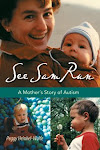He was slow to warm to the Kindle, Amazon's e-reader that I bought him for Christmas, but by the end of the semester, his study routine depended heavily on two key features -- "text-to-speech" and "search this book."
By the middle of the semester, he got in the habit of starting each tutorial with the Kindle reading the opening scenario and concepts to him. When he got to the working steps of the tutorial, he went back to the textbook, so he could slow the pace down.
We found that to be one of the disadvantages of the text-to-speech feature. You have to turn it off in order to navigate around the book.
[I can see why the Kindle was abandoned by some universities that were trying it out -- accessibility problems and some publishers holding onto reading rights (um, publishers, let's differentiate between that and performance rights, ok?)]
When Sam got to the end of a tutorial or unit, he used the search to hunt down passages to evaluate true/false or multiple choice questions on his quizzes. His quizzes were timed -- he had an hour to answer 20 questions -- so the Kindle had the potential to get him to the right spot quickly.
Occasionally a quirky search result made us wonder if a low battery affected the power of the search.
After several tutorials, the professor provided a long list of prompts that went back through three or four chapters in order to prepare for the exam. Sam has long been accustomed to using indices and glossaries, but I watched him use the Kindle to make quick work of those searches, too.
One note of caution: the reader who is spatially oriented won't like how the search-the-book feature drops you into the middle of a passage without any sense of where you are in the book. Locations are numbered. There is nothing in the margins of the screen that specify the chapter, page number or any other context, unless you happen to fall below a heading of some kind.
Along the way, I showed him how to use other features -- highlighting and annotating. Sometimes, a concept was better understood by highlighting the the topic sentence of several consecutive paragraphs.
And sometimes, I could explain a concept better than the author, so I inserted an annotation. Sam is smart, and most of the concepts are explained plainly and directly, but not always.
We writers that think we are being crystal clear with our explanations find out how sorry our directions are with readers like Sam.
For example, in the guidelines for designing a database, the first recommendation is "identify all the fields needed to produce the required information." Translation: make a list of the fields. Next, "organize each piece of data into its smallest useful part" and "group related fields into tables." Translation: break up any fields that can be made smaller, then sort them.
I really couldn't translate the concept of "putting common fields in each table." At that point we had to draw a lot of pictures and work with a lot of examples.
Which, by the way, the Kindle needs a drawing tool.
[Sam never liked writing in his books, since he always wanted to sell them back at the end of the semester. I've learned that computer majors and music majors experience obsolescence in their disciplines at a different pace.]
With charts, the Kindle also comes up short. The text-to-speech feature doesn't read them. And they enlarge only one level (you have to position the cursor over them until the plus-sign appears in order to enlarge them.) If Sam hadn't had the book, he wouldn't have been able to complete some of the later assignments, because the book asked him to copy code in the chart.
The embedded dictionary is a powerful feature. Early in the semester, Sam needed a lot of the early vocabulary defined for him. With previous courses, he often skimmed past unknown words hoping he'd get the context eventually. I could see the point -- everything is moving so fast if you spend too much time looking up words you're scared of getting even further behind.
I don't think professors realize how much new vocabulary they throw at their students at the beginning of the semester.
All in all, though, Sam said he'll be looking for Kindle versions of next year's textbooks. It was a powerful tool. He recognized it's power when I first showed it to him, and was almost afraid of it (he called the dictionary "addictive"), so if you plan on introducing it to your special reader, go slow at first. Look for teachable moments, they'll come.
I knew we were good when I borrowed it one morning and had to promise to have it back by that afternoon.






No comments:
Post a Comment